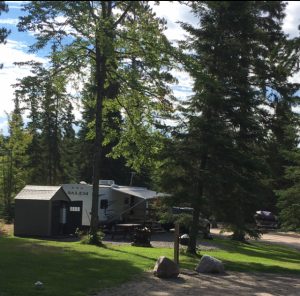
 Winter is here and it’s time to start preparing your RV for the cold season. By performing these winter preparation tips for your RV, it will be ready to use when spring season comes around. Here’s what you need to know.
Winter is here and it’s time to start preparing your RV for the cold season. By performing these winter preparation tips for your RV, it will be ready to use when spring season comes around. Here’s what you need to know.
1. Drain The Water System
It’s the most crucial thing to do when winterizing your RV. If you leave any water in the plumbing system, it’s likely going to freeze thus breaking fittings and lines. You will end up spending a lot of money to repair this damage.
2. Prep The Exterior
Visit the nearest RV service center and prep the exterior. This involves a thorough inspection of the sidewalls, roof, windows, seams, access panels and exterior doors. Don’t forget about resealing or re-caulking any cracks or holes. It will prevent water from getting anywhere inside the RV and avoid damage that needs costly repairs when spring comes around.
3. Choose A Safe Location
During the winter season, make sure your RV is parked in a roof or shelter. However, some RV owners might be restricted when it comes to shelter for their RV’s. If you are planning to store the RV in the yard or driveway, you should look for a location that’s sheltered from the wind. Make sure it is parked away from any trees that are likely to come down in an ice or wind storm.
4. Cover It Up
If you RV will be stored outside all winter, you need to look for a good cover for it. That way, your RV is protected against any exposure to ultraviolet rays known to damage the paint finish. The cover will also protect the vehicle from bird droppings, tree sap or wind damage. Don’t choose a plastic tarp because moisture will be trapped between the vehicle and the tarp.
5. Protect The Tires
Tires are also susceptible to damage because of the UV rays from the sun. Make sure the RV tires are protected with covers you can find in your local RV dealership. Choose covers that fit properly to protect the tires throughout the winter season.
6. Save The Batteries
Disconnect the batteries from your RV and store them in a cool and dry place. Make sure they are not exposed to the cold. When in storage, the batteries are likely going to lose their charge but the cool temperature slows it down.
Check the charge on the batteries every 4 – 6 weeks using a voltmeter and charge them if necessary to keep them fully charged. Remember, a partially charged battery will freeze faster than a fully charged one. Freezing often damages and destroys the batteries.
7. Add A Fuel Stabilizer
With time, any gas left in the tank will go bad leaving some resin deposits as a result of oxidation. These deposits will often damage the engine. During the winter season, you need to use a fuel stabilizer to prevent these deposits from being created.
8. Protect It From Critters
Small critters such as squirrels and mice love making RVs their winter homes. If this happens they are going to chew through the wiring, rubber and plastic components. You need to remove the temptation if you want to discourage the rodents. Make sure there is no food in the RV and clean the freezer, refrigerator, countertops, cupboards and floors thoroughly.
9. Check Up On The Stored RV Regularly
Every few weeks, you need to check on your stored RV during the winter season. Check if there is any exterior damage to the vehicle or water penetration. Check for odors too. If there is any damage, it’s advisable take the RV to the local service center for repairs. If you ignore the damage, it’s likely going to get worse by spring.
Visit https://www.hqrvpark.com/ for more information on how to winterize your RV.

Recent Comments